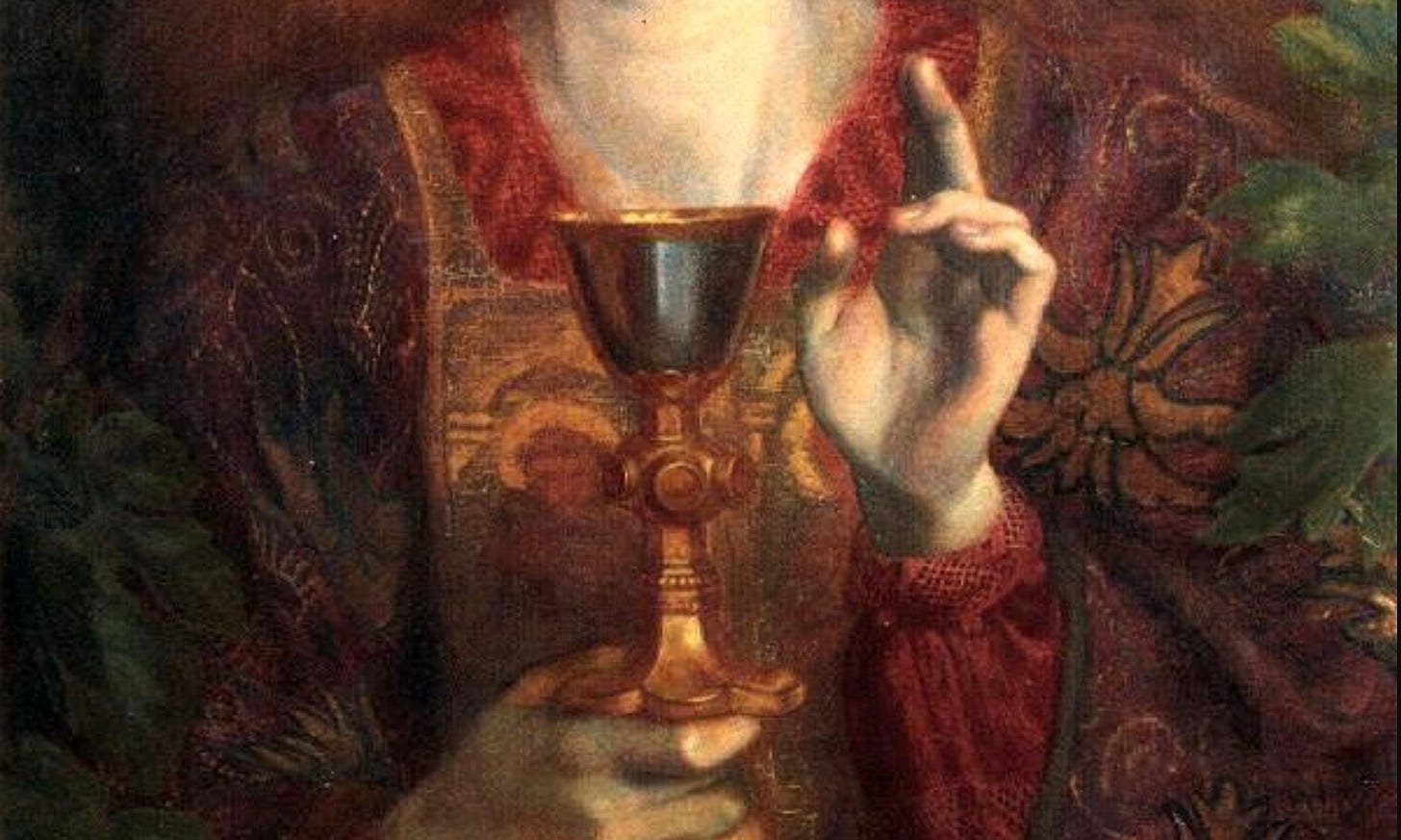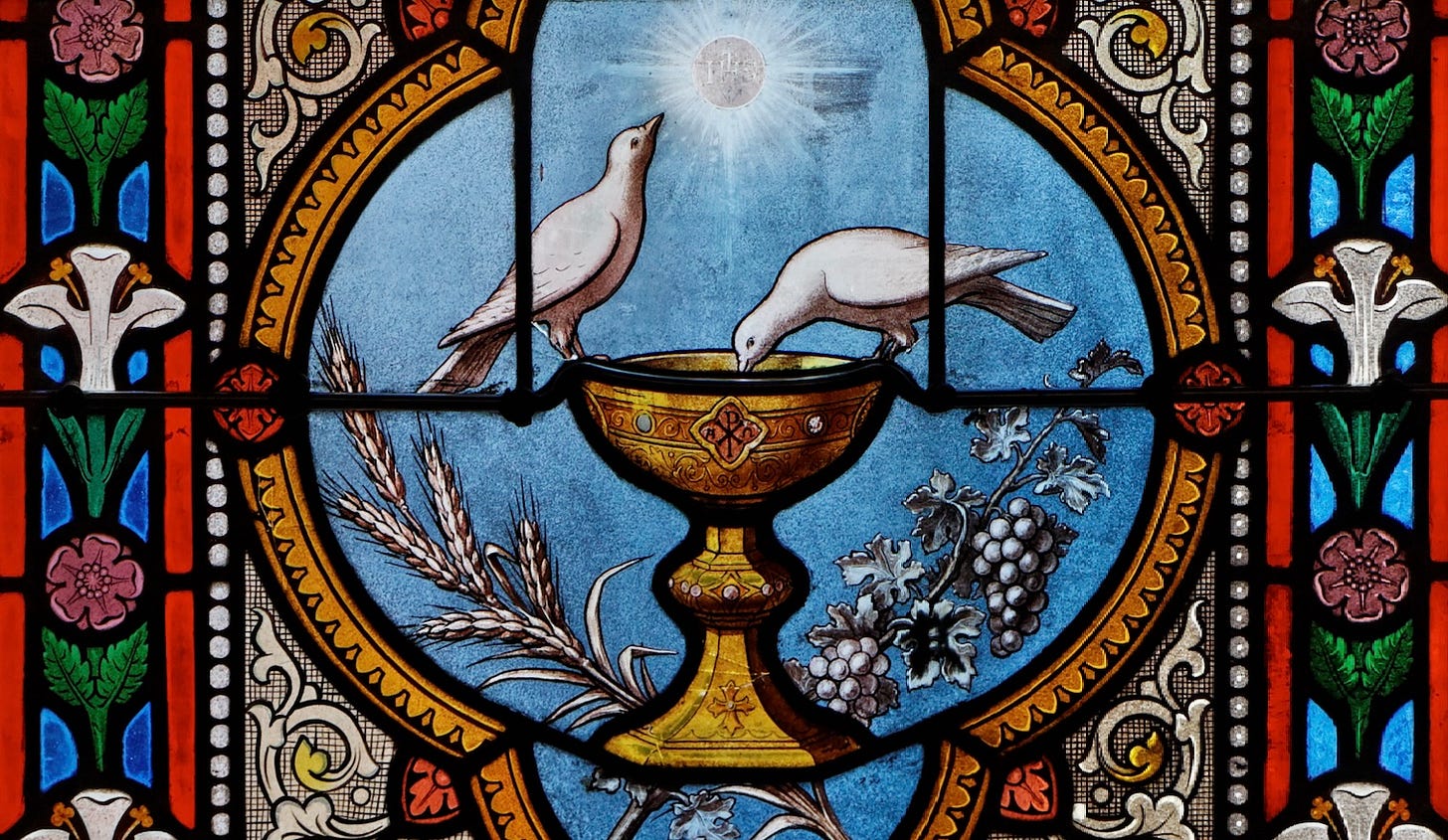The Holy Grail—What, Why and Wherefore Is It?
Spoiler alert: they really didn't choose that poorly
There’s no Holy Grail in the Bible.
The Holy Grail came into being, like so many things, as a random cool idea that Chrétien de Troyes had in the 12th century. (That’s also how we got Camelot. And Lancelot.) In Chrétien’s Perceval, or the Story of the Grail, Sir Percival (as I will now spell it) happens upon the Holy Grail in the castle of the Fisher King.
Chrétien doesn’t refer to it as the Holy Grail yet, or even as the Grail. It’s just a grail, small g—a dish essentially. It’s gold and glowing and covered with jewels, which means that everything we learned from Indiana Jones and the Last Crusade was wrong and the Nazi lady actually chose pretty well. It contains a Communion wafer.
But the grail is already a test: Percival is supposed to ask a specific question about it, which, if asked, will heal the Fisher King. But he doesn’t know the question, so he doesn’t ask it, and he fails. (The question he was supposed to ask was—in some versions—“whom does the Grail serve?” Alert readers will spot that line in The Bright Sword, but recontextualized.)
Later various ladies scold Percival about it, and Gawain has a big adventure, though as usual he doesn’t get top billing—Gawain is always getting short shrift. And that’s it. Chrétien left the poem unfinished, and Percival never comes back to the castle to claim the grail and finish the quest.
But something about the idea of the grail stuck with people, because they couldn’t leave it there. At least four different poets wrote continuations of Percival, and fairly quickly the quest for the Holy Grail became a major set piece in the Arthurian legend. It got a backstory—Joseph of Arimathea used the Grail to catch the blood of Christ on the cross—and then later it was combined with the Holy Chalice, which was the cup Jesus drank from at the Holy Supper.
Percival would eventually get elbowed aside as Grail Knight #1 in favor of Sir Galahad. The Grail got a home base too, namely the castle of Corbenic (title drop!)
Books like James George Frazer’s The Golden Bough1 try to frame the grail as part of a larger universal mythology, and though Frazer is very much not considered the thing these days, the Grail does seem to crop up everywhere; like Excalibur it propagates itself way beyond its native Arthurian context, into Sailor Moon, Stargate, Assassin’s Creed, The Office etc. and beyond. It has become the Macguffin of all Macguffins. The Last of Us played very much as a Grail story to me, where Ellie is both knight and Grail at the same time, and she and Joel are on a quest to lift the curse from a Waste Land …
There’s a Holy Grail in The Bright Sword too; in fact there’s quite a lot of it. I wanted to find a skewed, jaundiced perspective from which to view the Grail Quest, so it’s narrated by Sir Dagonet, the Fool Knight, who is, as you can imagine, not himself a top-seeded contender for the title of Grail Knight. Also pace Chrétien I imagined the Grail as more silvery than gold—smooth and mirror-reflective, like the bad Terminator in Terminator 2.
But what really drew me to the Grail story was the idea that it was both a glorious quest and at the time a terrible, fatal mistake. It basically destroys the Round Table. Arthur smells a rat right away and refuses to seek the Grail, and as usual he’s not wrong. The whole conceit of the Grail is that it represents an ideal beyond human attainment, and many, many of the knights of the Round Table die searching for it—it’s like a video game where the difficulty is set way too high. (Gawain alone slays eighteen of the knights; he still doesn’t get top billing.)
And for what? When it’s all over Galahad dies from being too awesome, and God takes the Grail away and it’s never seen again.
The Grail Quest turns out to be the Table’s greatest triumph and also its undoing—in a way all that follows, the whole debacle of Lancelot and Guinevere and Mordred, is just a coda. The Age of Arthur ended at Corbenic. The great Arthurian scholar Norris J. Lacy says it better than I could:
With the Grail quest completed, there are no more adventures to seek and no more challenges to face, except the challenge of somehow keeping Camelot alive, if only by artificial means such as serial tournaments. Arthur’s ideal is a largely useless relic of the past; his is a culture whose glory, whose time, is gone.
As an astute commenter pointed out, in my original version of this post I foolishly attributed The Golden Bough to Charles Frazier, who is in fact the author of Cold Mountain. I had lunch with Frazier a million years ago, when I was a book critic, and he was an affable fellow, but he did not do any dying or reviving that I noticed.





Mistakes were made. . . . Brilliant summation here - along with the finale: Ellie as Grail/vessel is so convincing!
Could the The Golden Bough-writing Frazer in question be Sir James George Frazer rather than Cold Mountain author Charles Frazer?